how can i grouping a data with conditional if bill < 10 ?
i have table:
meetingId | bill
------------------
a | 6
b | 7
c | 1
a | 5
a | 3
b | 4
g | 2
expected results :
a = 6+5+3 = 14 limit is 10 --> 10 and 4
b = 7+4 = 11 so limit is 10 --> 10 and 1
c and g not over the limit.
meetingId | bill
------------------
a | 10
a | 4
b | 10
b | 1
c | 1
g | 2
i tried in SQL why but i stuck with if condition
my SQL :
SELECT NO_ORDRE
,ORDRE.CODE_CLIENT As CodeCl
,[CODE_DEST]
,ORDRE.RS_NOM As OrdreRS
,ORDRE.ADRESSE As OrdreAdr
,ORDRE.CP As OrdreCP
,ORDRE.VILLE As OrdreVille
,ENLEV_CREMB
,ENLEV_DECL
,MODAL_MODE
,[PAYS]
,[INSEE]
,[SIRET]
,ORDRE.TEL As OrdreTel
,ORDRE.FAX As OrdreFax
,[EMAIL]
,[NBR_COLIS]
,[POID]
,[OBS]
,[DATE_CREE]
,[DATE_MODIF]
,[REF_EXPED]
,[AUTRE_REF]
,[AGENCE]
,[TRANSPORTEUR]
,NOM
,CAPITAL
,LIBELLE
,T_LOGO.IMG As FaImg
,T_LOGO.ADRESSE As FaAdr
,T_LOGO.CP As FaCp
,T_LOGO.VILLE As FaVille
,T_LOGO.TEL As FaTel
,T_LOGO.FAX As FaFax
,FAWEB_CLIENT.RS_NOM As CliRsNom
,FAWEB_CLIENT.ADRESSE As CliAdr
,FAWEB_CLIENT.CP As CliCp
,FAWEB_CLIENT.VILLE As CliVille
FROM [ORDRE]
LEFT JOIN T_LOGO ON ORDRE.TRANSPORTEUR = T_LOGO.NOID
LEFT JOIN FAWEB_CLIENT ON ORDRE.CODE_CLIENT = FAWEB_CLIENT.CODE_CLIENT
WHERE (STATUT_ORDRE = 2) AND (TRANSPORTEUR IN (SELECT ParsedString From dbo.ParseStringList(@Trans)))
and then i use in C#
List<Pers_Ordre> oListOrdre = new List<Pers_Ordre>();
while (readerOne.Read())
{
Pers_Ordre oPerOrdr = new Pers_Ordre();
Pers_Ordre test = (from t in oListOrdre where t.DestId == readerOne["CODE_DEST"].ToString() select t).FirstOrDefault();
oPerOrdr.OrdreId = Convert.ToInt32(readerOne["NO_ORDRE"]);
oPerOrdr.DestId = readerOne["CODE_DEST"].ToString();
if (test == null)
{
oListOrdre.Add(oPerOrdr);
}
else
{
int NbrColis = (from t in oListOrdre where t.DestId == readerOne["CODE_DEST"].ToString() select t.NbrColis).FirstOrDefault();
if (NbrColis < 5)
{
test.NbrColis += NbrColis;
}
}
}
it not work what i expected.
Thanks for your help!


